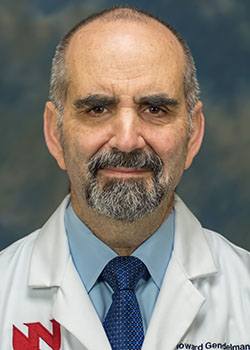Researchers at the University of Nebraska Medical Center (UNMC) have published data in the high-impact journal Nature Communications that may lead to a novel, long-acting treatment for both HIV and Hepatitis B (HBV).
The interdisciplinary team was led by Benson Edagwa, PhD, associate professor and head of the Medicinal Chemistry Laboratory in the UNMC Department of Pharmacology and Experimental Neuroscience (PEN). The report, "Transformation of tenofovir into stable ProTide nanocrystals with long-acting pharmacokinetic profiles," describes a novel long-acting drug formulation that may lead to HIV and HBV treatment and prevention.
 |
 |
| Denise Cobb, PhD | Howard Gendelman, MD |
The UNMC study demonstrates for the first time the chemical transformation of a daily antiviral medicine, called tenofovir (TFV), into a long-acting injectable that can be administered at or beyond two months. TFV is an antiviral that blocks viral growth inside human cell targets. By taking infrequent treatments, patients don’t need to worry about carrying around pills, skipping doses or the stigma of having to take these medicines.
UNMC got there by not only taking the road less traveled – but, one many thought was impassable. "We think this is going to be a major step forward and takes the subject of ultra long-acting antivirals in a new direction than previously thought," Dr. Edagwa said.
Dr. Edagwa zigged where others had zagged, testing his ideas that there might be further possibilities beyond what had previously been established in scientific literature. UNMC was able to make several leaps by modifying TFV using a naturally-found lipid that is used to treat cold sores. This not only made the drug more effective and stable, but also made it possible to easily manufacture the drug formulation. Due to its unique chemical makeup the compound is a prodrug – it becomes effective only when it reaches its virus target cells and tissues.
"The nanoparticles allow the drug formulation to be dissolved in bodily fluids," said the study’s lead author Denise Cobb, PhD, formerly of UNMC and now at Bristol Myers Squibb. The nanoparticles slowly break apart to release the prodrug, which then is converted into its active form in bodily fluids containing required chemicals and enzymes.
Study collaborators included Howard Gendelman, MD, chair of the UNMC PEN department. Dr. Gendelman noted the impact of TFV’s potential for treatment and prevention of HIV and HBV infections.
"None of the only available monthly long-acting antiretrovirals for HIV are active against Hepatitis B," Dr. Gendelman said. "Given TFV is a cornerstone for treatment of both viral infections, a long-lasting medicine in this class would be a game-changer."
Drug testing was conducted in animal models. According to the study, no untoward side effects were seen. Human testing has not yet begun, but the development necessary to achieve this goal is well underway through Exavir Therapeutics Inc., a spinoff company from the laboratories of Drs. Edagwa and Gendelman.

This is awesome! Congrats to all on a landmark discovery.
Well done – congratulations to all of you!
Congrats